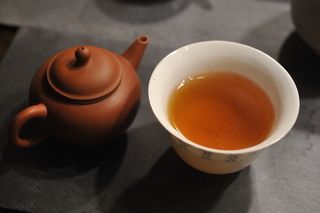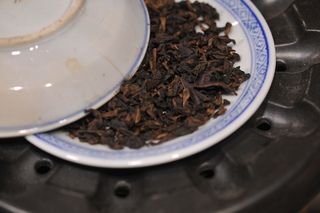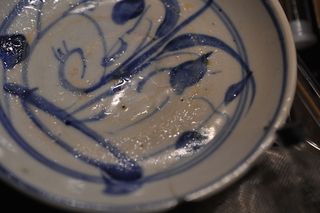Sourness in Yancha
I notice that certain Yancha developed sour profile after long storage say 5 years onwards. I am curious if this is a desirable profile and what causes the sourness. Thanks in advance for any feedback and opinion. 
Re: Sourness in Yancha
whats the climate like where you are?AT333 wrote:I notice that certain Yancha developed sour profile after long storage say 5 years onwards. I am curious if this is a desirable profile and what causes the sourness. Thanks in advance for any feedback and opinion.
Re: Sourness in Yancha
Hey, thanks kyarazen. Would be good if you based on where you are to share your experience. So let's based on Singapore climate, hot humid. Thanks a lot 
Re: Sourness in Yancha
ah. are you in singapore too?AT333 wrote:Hey, thanks kyarazen. Would be good if you based on where you are to share your experience. So let's based on Singapore climate, hot humid. Thanks a lot
it is a very interesting topic actually. here are my observations and findings.
Rolled oolongs have a lower propensity to go sour as compared to unrolled ones, in the rolled state, air and water is excluded from the core.
Periodic re-roasting prevents this, but re-roasting causes the tea quality to fall drastically. In unrolled oolongs such as yancha, they are extremely quick brewing teas, this is due to the processing, where during kneading the tea leaf's juices squeezed out form a layer/coating on the surface of the leaf. this coating contains lots of aromatics, florals, thick mid notes, etc.
with prolonged roasting, or repeated roastings, this tea juice coating breaks down and the tea loses the premium luscious notes. if you're in SG you can pick up a pack of wang san yang's bu zhi chun, this tea has been re-roasted a few times, whilst the "岩韵" is somewhat intact since minerals are not lost, the deep florals and ringing high traits of a good yancha is diminished. but being a tea that is many years old, this tea is not sour at all.
i have tasted several "sealed" in tin canister high quality yanchas from '93, '95, '97, '98 etc, all never been re-roasted before and have found that even in such conditions, they do turn in some degrees sour. this is inherently due to the water content that the leaves have in them, despite being at a low 4 or 5% when stored (which in texture is crispy dry), is still sufficient to cause them to go sour.
similarly, for early generation TKY (more than 20 yrs ago) when they didnt have the technology to roll into tight round balls, leaving the leaf semi rolled and loose, even at around 6% water content (decently crispy dry), dry sealed storage, it goes sour!
you can see how "well stored" this tea is.. over 20 years old, 5 grams into a 80ml pot, orangey reddish brew with no hints of damp humid storage (that would turn the brew murky or dark red black).. sour! like biting into a sour plum.


the tea was brewed after i attempted to roast out as much of the 6% water content as possible.

and if you collect the condensate in a saucer, taste it.. eek! this liquid condensate is as sour as.. pickling solutions! (half the sourness of a macdonald big mac's dill pickle)
the bottom line here
1) nothing's permanent, no matter how dry your tea is, and how sealed, it still will oxidize. this is more prominent for unrolled uncompressed teas, as compression leads to anoxic and compact interiors that prevent water/air entry. i tend to think anoxic and compact dry interiors is a main reason why many of the old pu-erhs were successfully aged.
2) this TGY, if it had been drunk it in its prime, would have been fantastic, the amount of "tea juice" on the surface of the leaf is impressive, its a very fast brewing TGY. but now with all that aging, all the years.. it gives a dried plum profile after roasting out the acid, a bit tangy etc.. to me it is nothing worthy nor valuable.
3) to keep yancha or such new teas in their best conditions for a very long time, do not re-roast at the expense of decreasing the tea quality, instead go for oxygen absorbers, moisture absorbers (sillica gel), pack the tea in a dry environment, and store everything at a low temperature.
4) drink a tea at its prime whenever possible
a friend had counter argued that in chao-zhou people did emphasize drinking aged yanchas, but upon my cross checking with some chinese sources, the people in chaozhou do re-roast their teas, and that the brewing style and tradition focuses on the 韵, re-roasted tea is always sweeter and has a lower margin for brewing error, and allows the CZ drinkers to also push the intensity. they dont drink the sour stuff in gongfu style for sure..
Re: Sourness in Yancha
Thanks a lot kyarazen for sharing your experience and opinion. I do appreciate it. Can I ask further. Is the sourness caused by oxidation due to moisture and air? If it is, I am just curious, and it cross my mind that if Puer oxidise (not ferment), the sourness don't seems to appear as compared to TKY or Yancha. I suspect the processing of Puer and Yancha/TKY play a bit part in the difference. Any thoughts on this? Thanks 
Re: Sourness in Yancha
oxidation due to air mainly, the water is just a "solvent" perhaps. the acid's formed when some of the hydroxyl groups somewhere gets oxidized into carboxylic acids.AT333 wrote:Thanks a lot kyarazen for sharing your experience and opinion. I do appreciate it. Can I ask further. Is the sourness caused by oxidation due to moisture and air? If it is, I am just curious, and it cross my mind that if Puer oxidise (not ferment), the sourness don't seems to appear as compared to TKY or Yancha. I suspect the processing of Puer and Yancha/TKY play a bit part in the difference. Any thoughts on this? Thanks
mid oxidation or higher oxidation oolongs are at higher risks. usually for greener teas, or sheng pu-erh, due to the high levels of anti-oxidants originally present in the tea, they are a lot more resistant to oxidation. this is also the divide between sunned maocha and baked maocha, the sunned one will age better because of photo-oxidation from the sun.
the amount of kneading too. previously in the 80-90s, pu-erh tea is simply sunned, steamed not very much kneaded and then compressed. the modern sheng pu-erhs are much more heavily kneaded to reduce bitterness, and to squeeze the tea juices out to the surface to give that fruity, floral scent. so it might be possible that the latter type would have a higher chance to go sour if improperly stored
Re: Sourness in Yancha
Thanks kyarazen. From your explanation, it seems that the juice squeeze out during kneading process makes the tea run into the risk of turning sour over a long period of storage. That is a good observation. Perhaps eventually that is no way that Yancha can last that long in storage, or at least to maintain its original goodness. I have seen collectors gunning for very old aged Yancha. Maybe it is a wiser consideration to get a relatively newer, better and cheaper ones and drink them up without waiting for years for it to turn sour.kyarazen wrote:oxidation due to air mainly, the water is just a "solvent" perhaps. the acid's formed when some of the hydroxyl groups somewhere gets oxidized into carboxylic acids.AT333 wrote:Thanks a lot kyarazen for sharing your experience and opinion. I do appreciate it. Can I ask further. Is the sourness caused by oxidation due to moisture and air? If it is, I am just curious, and it cross my mind that if Puer oxidise (not ferment), the sourness don't seems to appear as compared to TKY or Yancha. I suspect the processing of Puer and Yancha/TKY play a bit part in the difference. Any thoughts on this? Thanks
mid oxidation or higher oxidation oolongs are at higher risks. usually for greener teas, or sheng pu-erh, due to the high levels of anti-oxidants originally present in the tea, they are a lot more resistant to oxidation. this is also the divide between sunned maocha and baked maocha, the sunned one will age better because of photo-oxidation from the sun.
the amount of kneading too. previously in the 80-90s, pu-erh tea is simply sunned, steamed not very much kneaded and then compressed. the modern sheng pu-erhs are much more heavily kneaded to reduce bitterness, and to squeeze the tea juices out to the surface to give that fruity, floral scent. so it might be possible that the latter type would have a higher chance to go sour if improperly stored
Re: Sourness in Yancha
yup! when collectors go for very old aged yancha, these teas at some point of time in their aging process must have been re-roasted. with this "tea juice" roasted down/off, the sourness will eventually go away and not re-appear in subsequent aging. (a bit of acid may be useful in creating the aged taste though, as per the comparison between acid paper aging and acid free paper aging)
that said, i'm planning to roast a kilo or two of that sour aged TKY and see if i can collect "tea vinegar"
for newer yancha, if you find something good, the cool, sealed aging at under 4% water content can be great for a few years as the "fire" from the first roast recedes. it should be stable in such conditions for a decade or so, two or three decades may be risky
that said, i'm planning to roast a kilo or two of that sour aged TKY and see if i can collect "tea vinegar"
for newer yancha, if you find something good, the cool, sealed aging at under 4% water content can be great for a few years as the "fire" from the first roast recedes. it should be stable in such conditions for a decade or so, two or three decades may be risky
AT333 wrote: Thanks kyarazen. From your explanation, it seems that the juice squeeze out during kneading process makes the tea run into the risk of turning sour over a long period of storage. That is a good observation. Perhaps eventually that is no way that Yancha can last that long in storage, or at least to maintain its original goodness. I have seen collectors gunning for very old aged Yancha. Maybe it is a wiser consideration to get a relatively newer, better and cheaper ones and drink them up without waiting for years for it to turn sour.
Re: Sourness in Yancha
Also depends on your personal preference. I like some sourness in aged teas, though gone too far, it can be unpleasant. And also depends on the original oxidation and roast level of the tea.
That said, if stored in a dry environment and well sealed, I think it's very possible to age yancha longer than that without any unpleasant tastes developing. For example, I have some new old stock Sea Dyke rou gui (in the pewter gift tins and cellophane box), stored in US since probably late 90s / early 00s. The tea itself is not the greatest quality in the world, but does not have any sourness really.
Also, with the re-roasting, it can be done very lightly and only every few years, just enough to remove the moisture. I tend to be suspicious of aged teas that are very heavily roasted, as they're often fake teas.
If memory serves, aged oolongs that have not been re-roasted, and are stored with more exposure to air, can be used for medicinal purposes (e.g., for constipation).
That said, if stored in a dry environment and well sealed, I think it's very possible to age yancha longer than that without any unpleasant tastes developing. For example, I have some new old stock Sea Dyke rou gui (in the pewter gift tins and cellophane box), stored in US since probably late 90s / early 00s. The tea itself is not the greatest quality in the world, but does not have any sourness really.
Also, with the re-roasting, it can be done very lightly and only every few years, just enough to remove the moisture. I tend to be suspicious of aged teas that are very heavily roasted, as they're often fake teas.
If memory serves, aged oolongs that have not been re-roasted, and are stored with more exposure to air, can be used for medicinal purposes (e.g., for constipation).